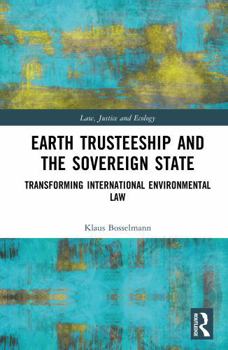Earth Trusteeship and the Sovereign State: Transforming International Environmental Law
This book makes an argument for the legal role and responsibility of sovereign states in the trusteeship of the earth.
In 1972, the first photo of the Earth - Blue Marble - sparked the imagination and need to care for our planet. In the same year, the world's first UN conference on the environment adopted the Stockholm Declaration, proclaiming that the Earth's natural resources and ecosystems 'must be safeguarded for the benefit of present and future generations'. Today, the Earth's ecological systems deteriorate at accelerating speeds, as if Earth does not matter to law and governance. But what if it does? Earth system science and related jurisprudence provide clear guidance for effective law and governance, in particular the trusteeship responsibilities of sovereign states. This book closes the gap between the promises of international environmental agreements and the concept of state sovereignty. Maintaining that state sovereignty is not an end in itself, but rather a means to protect the autonomy and freedom of citizens, the book develops the argument that sovereignty includes fiduciary duties for matters of global concern, such as human rights and ecological sustainability. Autonomy and freedom of citizens can only prosper if states protect human rights and ecological sustainability both inside and outside national boundaries. This is the logic behind global governance. And, as this book demonstrates, at its core stands the ancient idea of trusteeship: that is, of acting on behalf and to the benefit of those who cannot act for themselves.
This book's argument that earth trusteeship and the sovereign state mutually condition each other will appeal to scholars of environmental law, international law and environmental science, and others with an interest in ecology and global governance.





